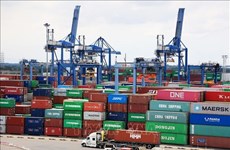Vietnam, China expand defined area for joint exploration at sea
The national oil and gas groups of Vietnam and China have inked a
deal on amendments to the 2006 Vietnam-China Joint Exploration Accord
for the Bac Bo (Tonkin) Gulf, during the State level visit to China
by President Truong Tan Sang from June 19-21.
The national oil and gas groups of Vietnam and China have inked a
deal on amendments to the 2006 Vietnam-China Joint Exploration Accord
for the Bac Bo (Tonkin) Gulf, during the State level visit to China
by President Truong Tan Sang from June 19-21.
Under Article 7 of the Vietnam-China Agreement on the Delimitation of the Territorial Sea, the Exclusive Economic Zone and the Continental Shelf in the Tonkin Gulf which was signed on December 25, 2000 and took effect on June 20, 2004, the two countries will cooperate to exploit any oil and gas deposits running across the boundary line.
In 2005, the Vietnam National Oil and Gas Group (PetroVietnam) and the China National Offshore Oil Corporation (CNOOC) signed a framework agreement on oil and gas cooperation in defined area in the Tonkin Gulf.
On the basis of the framework agreement, the two corporations signed an agreement on Vietnam-China joint exploration in defined area in the Tonkin Gulf on November 6, 2006, which took effect on January 2, 2007 after receiving approval of the two governments.
Since then, the two sides have conducted an array of oil and gas exploration activities in the Defined Area, including a 3D seismic survey; drilling an oil and gas exploration well; studying relevant documents and evaluating oil and gas potential.
The Vietnam-China joint exploration agreement has been amended three times under the permission of the two countries’ competent agencies, focusing on the duration to fulfill set tasks.
Over the past six years, despite no finding of commercial oil and gas, the two sides have collected important information regarding oil and gas potential in the area that serve as grounds for the expansion of the Defined Area while establishing fine cooperative relationship between them.
With a view to increasing chances to discover oil and gas potential and enhancing bilateral cooperation efficiency, with the permission of competent authorities, PetroVietnam and the CNOOC signed the fourth amendment agreement on June 19 during the ongoing State-level visit to China by President Truong Tan Sang. Under the amendments, the Defined Area for joint exploration will be expanded to 4,076 sq km from the current 1,541 sq km, covering two equal parts on each side of the boundary line, and the validity period of the joint exploration agreement will be extended to the end of 2016.
The Vietnam-China agreement on joint exploration in the Bac Bo Gulf is carried out by both sides with expenses divided equally. In case commercial oil and gas are found at the Defined Area, the two sides will discuss to move to a joint exploitation stage in line with international practice and each country’s law on the basis of respecting sovereignty and the sovereignty rights of each country in the Tonkin Gulf region, and ensuring the interests of both sides.
The newly-signed document which covers an area entirely inside the Tonkin Gulf, has no impacts on each country’s sovereignty in the Gulf as the two countries already inked the agreement on maritime boundary demarcation inside the gulf, PetroVietnam General Director Do Van Hau affirmed to reporters accompanying the Vietnamese delegation to China.
He said the agreement deals with purely economic cooperation that is joint oil and gas exploration.
Hau added that at the same time, it is different from other oil and gas contracts PetroVietnam has signed with some countries in that it covers cooperation between the national oil and gas groups of two countries in a shared sea area with a clear boundary line. Meanwhile the other contracts deal with activities in sea areas that entirely belong to Vietnam’s sovereignty.
According to the PetroVietnam leader, the area in Tonkin Gulf is believed to contain oil and gas, so the two sides have agreed to jointly conduct exploration and exploitation activities in a bid to maximise benefits. He said the cooperation only serves the economic interests of the two countries without relating to any third party.
The General Director stressed that the most important significance of the agreement is to enhance cooperation between PetroVietnam and CNOOC, thus contributing to boosting cooperation and mutual understanding between the two countries.-VNA
Under Article 7 of the Vietnam-China Agreement on the Delimitation of the Territorial Sea, the Exclusive Economic Zone and the Continental Shelf in the Tonkin Gulf which was signed on December 25, 2000 and took effect on June 20, 2004, the two countries will cooperate to exploit any oil and gas deposits running across the boundary line.
In 2005, the Vietnam National Oil and Gas Group (PetroVietnam) and the China National Offshore Oil Corporation (CNOOC) signed a framework agreement on oil and gas cooperation in defined area in the Tonkin Gulf.
On the basis of the framework agreement, the two corporations signed an agreement on Vietnam-China joint exploration in defined area in the Tonkin Gulf on November 6, 2006, which took effect on January 2, 2007 after receiving approval of the two governments.
Since then, the two sides have conducted an array of oil and gas exploration activities in the Defined Area, including a 3D seismic survey; drilling an oil and gas exploration well; studying relevant documents and evaluating oil and gas potential.
The Vietnam-China joint exploration agreement has been amended three times under the permission of the two countries’ competent agencies, focusing on the duration to fulfill set tasks.
Over the past six years, despite no finding of commercial oil and gas, the two sides have collected important information regarding oil and gas potential in the area that serve as grounds for the expansion of the Defined Area while establishing fine cooperative relationship between them.
With a view to increasing chances to discover oil and gas potential and enhancing bilateral cooperation efficiency, with the permission of competent authorities, PetroVietnam and the CNOOC signed the fourth amendment agreement on June 19 during the ongoing State-level visit to China by President Truong Tan Sang. Under the amendments, the Defined Area for joint exploration will be expanded to 4,076 sq km from the current 1,541 sq km, covering two equal parts on each side of the boundary line, and the validity period of the joint exploration agreement will be extended to the end of 2016.
The Vietnam-China agreement on joint exploration in the Bac Bo Gulf is carried out by both sides with expenses divided equally. In case commercial oil and gas are found at the Defined Area, the two sides will discuss to move to a joint exploitation stage in line with international practice and each country’s law on the basis of respecting sovereignty and the sovereignty rights of each country in the Tonkin Gulf region, and ensuring the interests of both sides.
The newly-signed document which covers an area entirely inside the Tonkin Gulf, has no impacts on each country’s sovereignty in the Gulf as the two countries already inked the agreement on maritime boundary demarcation inside the gulf, PetroVietnam General Director Do Van Hau affirmed to reporters accompanying the Vietnamese delegation to China.
He said the agreement deals with purely economic cooperation that is joint oil and gas exploration.
Hau added that at the same time, it is different from other oil and gas contracts PetroVietnam has signed with some countries in that it covers cooperation between the national oil and gas groups of two countries in a shared sea area with a clear boundary line. Meanwhile the other contracts deal with activities in sea areas that entirely belong to Vietnam’s sovereignty.
According to the PetroVietnam leader, the area in Tonkin Gulf is believed to contain oil and gas, so the two sides have agreed to jointly conduct exploration and exploitation activities in a bid to maximise benefits. He said the cooperation only serves the economic interests of the two countries without relating to any third party.
The General Director stressed that the most important significance of the agreement is to enhance cooperation between PetroVietnam and CNOOC, thus contributing to boosting cooperation and mutual understanding between the two countries.-VNA













